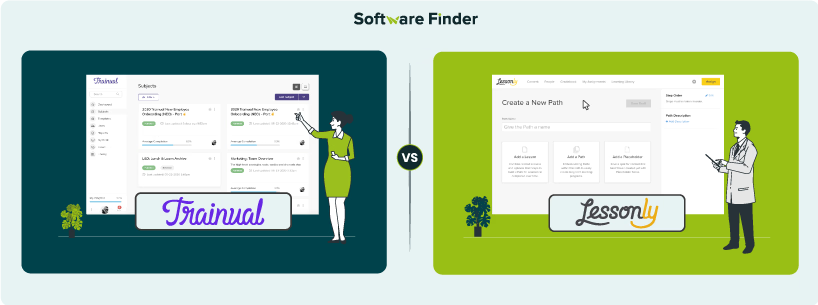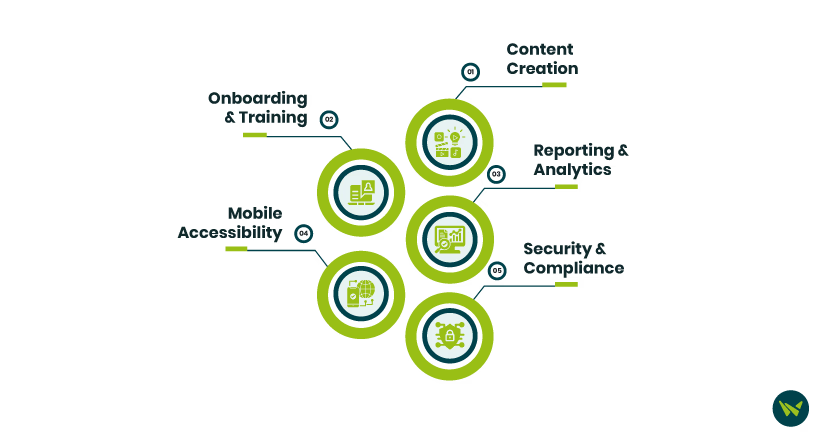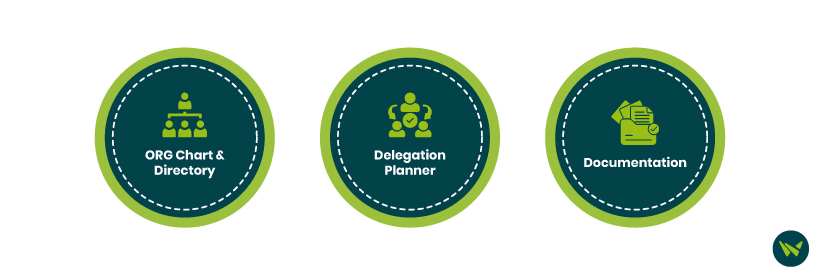
Employee training platforms are essential for onboarding, knowledge sharing, and maintaining consistent performance, especially in remote and hybrid work environments. In these setups, self-paced learning and proper documentation become crucial.
Trainual and Lessonly (now rebranded as Seismic Learning) offer distinct approaches to employee training. Trainual is designed to help businesses organize their standard operating procedures (SOPs), policies, and onboarding materials into a simple and accessible system. On the other hand, Lessonly focuses on interactive training that helps teams practice real-world skills through simulations and feedback.
In this comparison of Trainual vs Lessonly, we’ll look at both platforms in terms of key features, pricing, and the types of businesses they are best suited for. This will enable you to make an informed decision about which platform fits your training needs.

Feature | Trainual | Lessonly |
Content Creation | SOP builder with text, media, quizzes, 500+ templates, AI assistant, and drag-and-drop editor | Practice-based lesson builder with role-plays, simulations, video submissions, and manager feedback |
Onboarding And Training | Automated, role-based onboarding with AI search, tests, e-signatures, and progress tracking | Interactive onboarding with practice scenarios, role-plays, and manager-reviewed exercises |
Reporting And Analytics | Completion, e-signatures, AI tests, and knowledge gap reports | Dashboards, scorecards, coaching insights, and performance-linked metrics |
Mobile Accessibility | iOS/Android apps, NFC tap-to-train, mobile tests, and content search | Mobile responsive and offers iOS and Android apps for courses and practice exercises |
Security And Compliance | Zero-trust, encryption, PCI servers, SSO, SOC 2 Type I, audit features | Enterprise-grade security with global cloud and compliance controls |
Price | Four modular plans starting at $249/month with no setup fees* | Four Transparent pricing plans starting at $200/month* |
*Disclaimer: The pricing is subject to change.
Trainual is a centralized training platform built for small and mid-sized businesses that need to document processes, onboard new hires, and keep company knowledge organized. It allows users to create structured playbooks with step-by-step guides, policies, and role-based training. Its AI-powered authoring simplifies content creation, while embedded videos, quizzes, and process checklists help reinforce learning.
Progress tracking, simple knowledge checks, and reporting allow managers to monitor completion and address gaps. Employees can access content anytime through mobile or desktop. Trainual also offers pre-built templates, making setup fast and efficient even for teams with no prior experience.
Trainual is ideal for businesses seeking a simple, scalable solution to centralize training and SOP documentation without the complexity of a full LMS.
Unique Features Of Trainual

- ORG Chart And Directory: Provides teams instant clarity on responsibilities, growth opportunities, and team structure, while ensuring everyone stays connected
- Delegation Planner: Helps leaders identify which tasks to assign or delegate, helping boost engagement, productivity, and operational efficiency
- Documentation: Organize your how-to guides and turn SOPs into clear, step-by-step training manuals. Import existing content, customize templates, or create processes that document themselves
Pros And Cons Of Trainual
Pros:
- Great process formatting, allowing content to be broken down into clear, easy-to-follow steps for users
- Simple to use with powerful AI features, allowing users to easily add tone, captivating visuals, and work directly with AI while creating content
- Helps teams of any size standardize policies and processes, making it easy to organize and share information for consistent team access
Cons:
- Difficult to reset group progress for specific topics, and lacks detailed individual data tracking
- Navigation issues when going back, sometimes it redirects you to the wrong page instead of the page you were previously on, causing confusion and disrupting the user experience
Lessonly is an AI-powered training and coaching platform built for sales, customer service, and support teams that need more than basic training. It enables companies to create multimedia-rich lessons with videos, simulations, role-plays, and interactive exercises that allow employees to practice real-world scenarios.
The platform’s built-in coaching suite lets managers review practice exercises, give feedback, and track performance improvements. Skill assessments, readiness scorecards, and analytics enable businesses to directly link training to revenue outcomes, making them ideal for performance-driven organizations.
Seismic Learning is best for organizations that prioritize skill development, coaching, and sales enablement over static content delivery.
Unique Features Of Lessonly

- Enablement Intelligence: Provides data-driven analytics that improve sales training and boost engagement. It helps teams create repeatable performance and revenue growth
- Buyer Engagement: Strengthens relationships by delivering timely, tailored content that drives bigger deals, faster sales, and a smoother buyer journey
- Aura Copilot: AI-powered enablement assistant handles backend work so go-to-market teams can stay focused on selling and customer relationships
Lessonly Pros And Cons Of Lessonly
Pros:
- Saves time and reduces repetitive work, with easy duplication of training elements like headers, logos, and questions for faster course creation
- Easy-to-build trainings, with an intuitive design that allows anyone, even without a learning and development background, to create effective lessons
- Helps track progress effectively, with course completion notifications, short quizzes, and practice tasks that reinforce learning
Cons:
- Email reminders often land in the spam folder, causing missed tasks and deadlines
- Limited flexibility for external training, as it's primarily designed for internal employee education

Trainual offers transparent, predictable pricing based on team size, with optional add-ons for expanded features:
- Small (1–25 employees) – $249/month, billed annually
- Medium (26–50 employees) – $279/month, billed annually
- Growth (51–100 employees) – $419/month, billed annually
- Custom (101-10,000+ employees) – Customized pricing
Disclaimer: The pricing is subject to change.
Lessonly offers tiered pricing plans designed to scale with business size and training complexity:
- Free – $0/month (billed annually), supports up to 25 users for basic access
- Basic – $200/month (billed annually), for teams up to 100 users
- Plus – $500/month (billed annually), for teams up to 300 users, includes more advanced features
- Growth – $1,000+/month (billed annually), for 300+ users with enterprise-level customization and integrations
Disclaimer: The pricing has been sourced from third-party websites and is subject to change.
Choosing between Trainual and Lessonly depends on your company’s size, training goals, and the type of learning experience you want to deliver.
Trainual is an excellent fit for small to mid-sized businesses that need an affordable, simple platform to organize SOPs, streamline employee onboarding, and centralize internal knowledge. On the other hand, Lessonly is better suited for organizations that prioritize skill development, customer-facing role training, and advanced coaching with performance analytics tied to business outcomes.
Take the time to evaluate your team’s training needs, whether that involves structured documentation or performance-based coaching. Still not sure which platform is the better fit? You can contact our experts for personalized recommendations based on your business goals.
